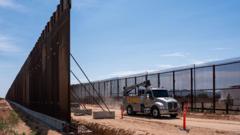In a significant shift in trade relations, Canada has decided to lift some of its retaliatory tariffs on US products, while still maintaining limits on specific sectors. Prime Minister Mark Carney confirmed this decision, which follows a phone conversation with President Donald Trump after both countries missed a deadline to finalize a trade agreement. Canada will remove tariffs on C$30 billion worth of goods in alignment with the US-Mexico-Canada Agreement (USMCA) but will retain the higher tariffs on autos, steel, and aluminium.
Canada Eases Trade Tension by Reducing Retaliatory Tariffs on US Goods

Canada Eases Trade Tension by Reducing Retaliatory Tariffs on US Goods
Canada’s Prime Minister announces the reduction of certain tariffs on US imports, while retaining some key levies, amidst ongoing trade negotiations.
As part of its trade strategy, Canada had imposed a 25% tariff on a wide range of American goods—including washing machines and orange juice—as retaliation for US tariffs on Canadian imports. Carney emphasized that the goal of this new measure is to facilitate the reestablishment of free trade for most goods exchanged with the US, and he anticipates this will strengthen trade ties between the two countries.
Polling indicates a majority of Canadians support the tariffs against the US, demonstrating a complex public sentiment toward trade issues. However, the decision to ease some of these tariffs has faced criticism from Conservative leader Pierre Poilievre, who labeled it a capitulation on part of Carney, in contrast to his earlier aggressive negotiation stance. In response, Carney highlighted that despite reducing tariffs, Canada still enjoys a favorable trade position—having an effective tariff rate significantly lower than many other nations.
This development comes as the US continues to enforce tariffs on steel, aluminium, and other imports in pursuit of favorable trade terms. The potential economic impact of these tariffs cannot be understated, as they have already resulted in job losses in Canada's manufacturing sectors, particularly in Ontario, which has seen substantial cutbacks in employment.
Moving forward, Carney stated that discussions will shift focus to key industries like automobiles, steel, and lumber, ahead of a scheduled review of the USMCA in the coming year. This ongoing trade dialogue underscores the delicate balance both nations are attempting to navigate amidst an evolving global trade landscape.
Polling indicates a majority of Canadians support the tariffs against the US, demonstrating a complex public sentiment toward trade issues. However, the decision to ease some of these tariffs has faced criticism from Conservative leader Pierre Poilievre, who labeled it a capitulation on part of Carney, in contrast to his earlier aggressive negotiation stance. In response, Carney highlighted that despite reducing tariffs, Canada still enjoys a favorable trade position—having an effective tariff rate significantly lower than many other nations.
This development comes as the US continues to enforce tariffs on steel, aluminium, and other imports in pursuit of favorable trade terms. The potential economic impact of these tariffs cannot be understated, as they have already resulted in job losses in Canada's manufacturing sectors, particularly in Ontario, which has seen substantial cutbacks in employment.
Moving forward, Carney stated that discussions will shift focus to key industries like automobiles, steel, and lumber, ahead of a scheduled review of the USMCA in the coming year. This ongoing trade dialogue underscores the delicate balance both nations are attempting to navigate amidst an evolving global trade landscape.




















